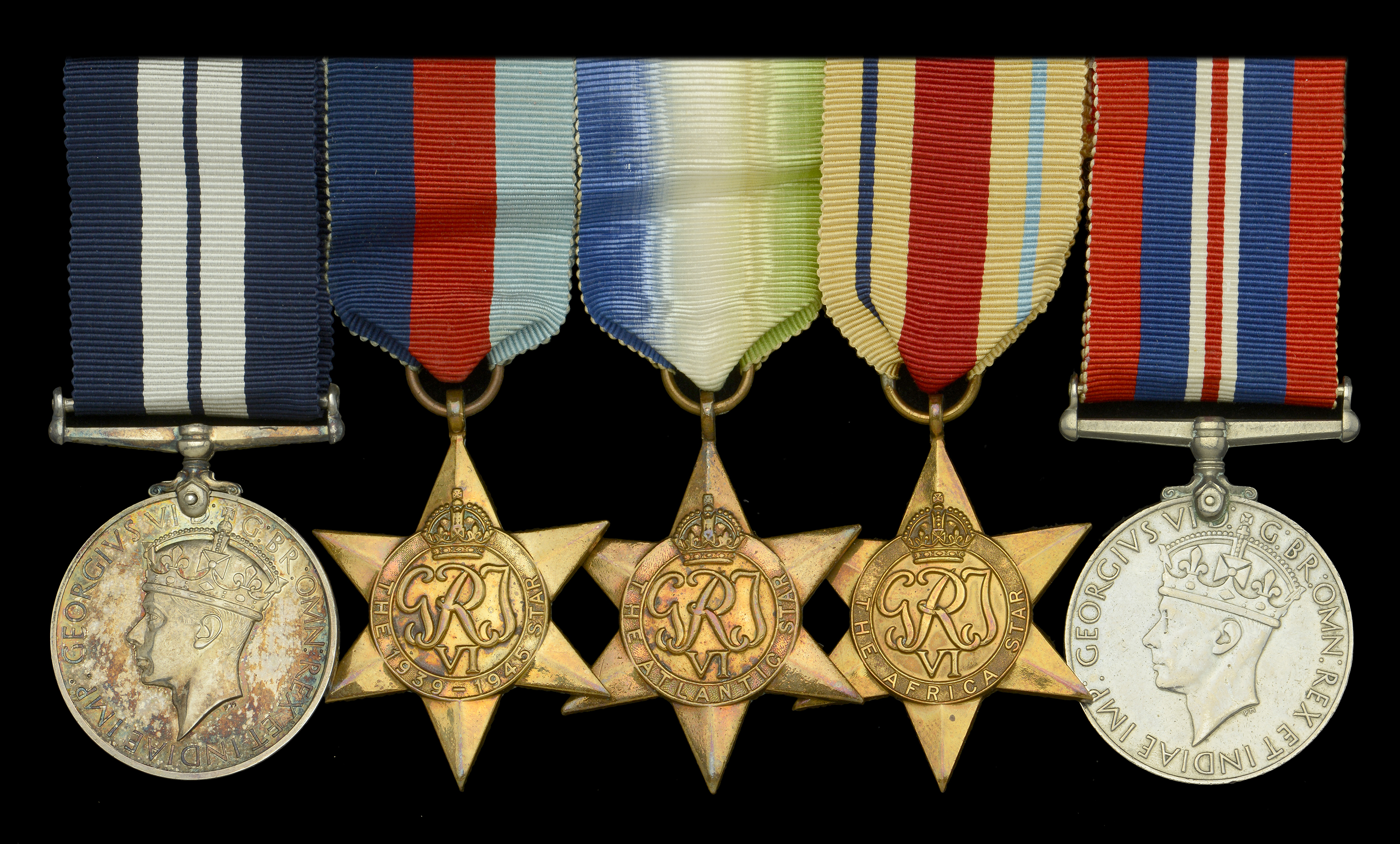An outstanding Second War D.S.M. group of five awarded to Assistant Steward W. Barnett, for his part in Captain Fogarty Fegen’s Victoria Cross action in H.M.S. Jervis Bay against the Admiral Scheer in 1940 Distinguished Service Medal, G.VI.R. (W. Barnett, Asst. Std. H.M.S. Jervis Bay.) impressed naming; 1939-45 Star; Atlantic Star; Africa Star; War Medal 1939-45, nearly extremely fine (5) £2,000-£3,000 --- Importation Duty This lot is subject to importation duty of 5% on the hammer price unless exported outside the UK --- --- Provenance: Douglas-Morris Collection, Dix Noonan Webb, October 1996. D.S.M. London Gazette 11 March 1941: ‘For courage and devotion to duty when H.M.S. Jervis Bay defending a large convoy was sunk by a powerful German warship.’ One of seven D.S.M’s awarded for this action. The following recommendation is taken from the official report on the loss of the Jervis Bay: ‘W. Barnett, Assistant Steward, T.124. This man was stationed in the foremost shell room, when things went wrong and the lights went out Barnett stuck to his post endeavouring to get the emergency lighting to work. He would not leave his post until he received definite orders to do so although he could serve no useful purpose by remaining below.’ William Barnett was one of many Merchant Navy men who volunteered to serve aboard his ship when it was taken up and converted to a war ship. These ‘T.124’ men were borne as naval ratings rather than merchantmen during the period of their service with the Royal Navy. Early in November 1940, the liner H.M.S. Jervis Bay (14,164 tons), serving as an armed auxiliary cruiser, was escorting a convoy of 38 ships across the Atlantic to British ports. The ship was under the command of Captain E. S. Fogarty Fegen, R.N., the convoy being under the command of Rear Admiral H. B. Maltby, R.N., who flew his flag on the Cornish City. On 5 November at about 5p.m. the convoy was attacked by the German pocket battle ship Admiral Scheer (10,000 tons, main armament six 11-inch guns) at a position some 1,000 miles east of Newfoundland. The enemy opened fire at a range of ten miles and the Jervis Bay steamed to engage although her 6-inch guns were outranged by the enemy's heavy 11-inch weapons. The action which ensued lasted for about an hour, the Jervis Bay sustaining the full weight of the enemy’s fire and effectively preventing him from concentrating on the convoy. At the end of that time the auxiliary cruiser was heavily on fire with every gun out of action, but night was coming on and the convoy, having concealed its movements by throwing over smoke floats, had scattered over a wide area. The Jervis Bay, though badly mauled, still continued to float, but two hours after the action ceased she sank with colours flying. Captain Fogarty Fegen, to whom a posthumous award of the Victoria Cross was made, lost an arm during the action and went down with his ship. The number of crew saved was 65, including a few Officers. The final number lost was 33 Officers and 147 Ratings killed, 13 of the latter being Canadians, with one Officer and nine Ratings later dying of wounds. A Swedish vessel, the Stureholm, which was sailing with the convoy turned back in a very gallant manner and her Commander, Sven Olander, lowered his boats and picked up the survivors. From the evidence of these men it was established that the steering gear of the Jervis Bay was smashed early in the action. Although the heroic delaying action of the Jervis Bay enabled the convoy to scatter over a wide area the speed of the Admiral Scheer enabled her to locate, overhaul, and sink, six of the ships. The remaining 32 ships in the convoy reached port safely. The following ships were sunk: Beaverford (10,042 tons), Maiden (7,908 tons), Mopoan (5,389 tons), Fresno City (4,955 tons), Kenbane Head (5,299 tons), and the Trewellard (5,201 tons). Including the Jervis Bay the tonnage of British ships lost in this action totalled 52,558 tons. 357 Officers and men were lost and 68 Officers and men were taken Prisoners of War. Although a major hunt was immediately instigated by the Admiralty, the Admiral Scheer managed to elude the allied forces and return in safety to Germany. Assistant Steward Barnett was one of the fortunate survivors of the Jervis Bay, but lost some of his upper teeth in the action, for which he was treated aboard H.M.S. Cormorin. In addition to the posthumous Victoria Cross granted to Captain Fogarty Fegan, one D.S.O., one D.S.C., one C.G.M., and seven D.S.M.s were awarded for this action. When the survivors reached safety and recounted their experiences, the story of the Jervis Bay thrilled the free world. It became one of the most famous naval sagas of all time, told and retold, commemorated in song, verse and film. ‘If ever a ship deserved a V.C.,’ said The Times, ‘that ship is surely the Jervis Bay.’ As Captain Olander of the Stureholm put it, ‘There she rode like a hero’. Sold with copied Admiralty ‘Secret’ report on the loss of H.M.S. Jervis Bay with recommendations for all awards, list of survivors and report of Fogarty Fegen’s posthumous V.C.





